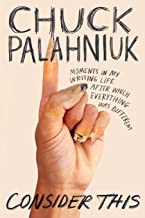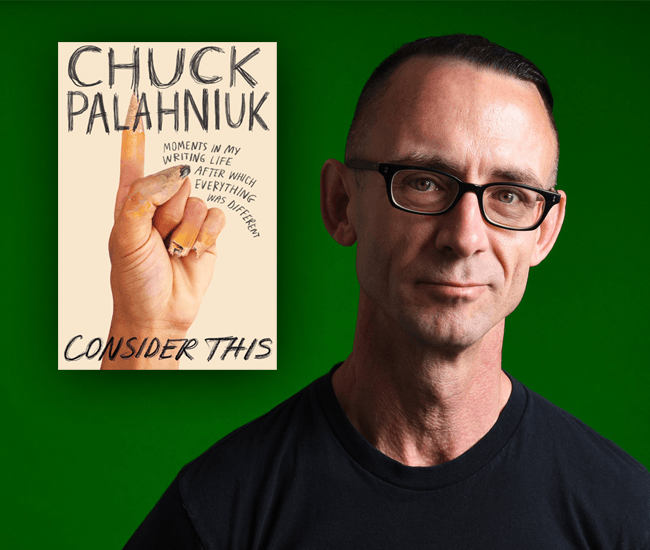Consider This by Chuck Palahniuk
To paraphrase Chuck Palahniuk, “People are always asking, did I know about Chuck Palahniuk.” Everyone does at this stage, at the very least from Fight Club, but for edgy kids who want to write edgy stories and didn’t grow up with Burroughs and Bukowski, this guy has always been the master of transgressive fiction.
Though his contemporary, Bret Easton Ellis, fell off the map last year with his reactionary nonfiction White—and consequently showed his hand, since complaining about people’s distaste for shock value for the sake of shock value is kinda an admission that there’s nothing under the surface—Palahniuk uses his memoir and sorta maybe writers’ guide to explain why he writes about the unsettling and how you can too.
Consider This: Moments in My Writing Life after Which Everything Was Different (Grand Central Publishing) is a book for those who want to learn to write dangerously, or perhaps just learn about the man who pioneered “dangerous writing.”
Palahniuk’s novels tend to begin in media res then jump around chronologically, and Consider This does something similar with his life. It’s a series of career and personal anecdotes that all tie back to his craft and are often followed by snippets of advice from famous friends.
Once at a speaking engagement he met beloved sci-fi author Ursula K. Le Guin who offered some constructive criticism on a short story: “Never resolve a threat until you raise a larger one.” Palahniuk takes this advice and spins a writing lesson out of it.
Part of the joy of reading this book is seeing one of my favorite authors explain certain choices he made in his most popular works, from Rant to the short story “Guts,” but the writing examples that accompany his short lessons are complete stories in themselves, each only a few lines, masterfully demonstrating escalation, subverting expectations and other tricks in the writer’s toolkit.
As Palahniuk’s own writing teacher Tom Spanbauer was something of a mentor to him, reading Consider This feels like attending a series of workshops with the Fight Club author. He’s not overly concerned with telling the reader his life’s story; it’s a jumping off point that he turns around after each brief vignette as if to say, see, that’s how you tell that kind of story.
Palahniuk says his “core theory is that we digest our experience by turning it into stories. Repeating the story—good or bad—allows us to exhaust the unresolved emotion of it.”
This book is designed more to get readers (and aspiring writers) to tell their own stories than to get them engaging with the stories of its author. It’s a book on how to write and it’s a book on why to write.
Ultimately, “it’s only by telling our stories that we get any sense of how extraordinary human existence actually can be.” Consider This might just inspire you try take a stab at telling your story.
Consider This is now available for purchase.
Buy this Book!
Amazon




